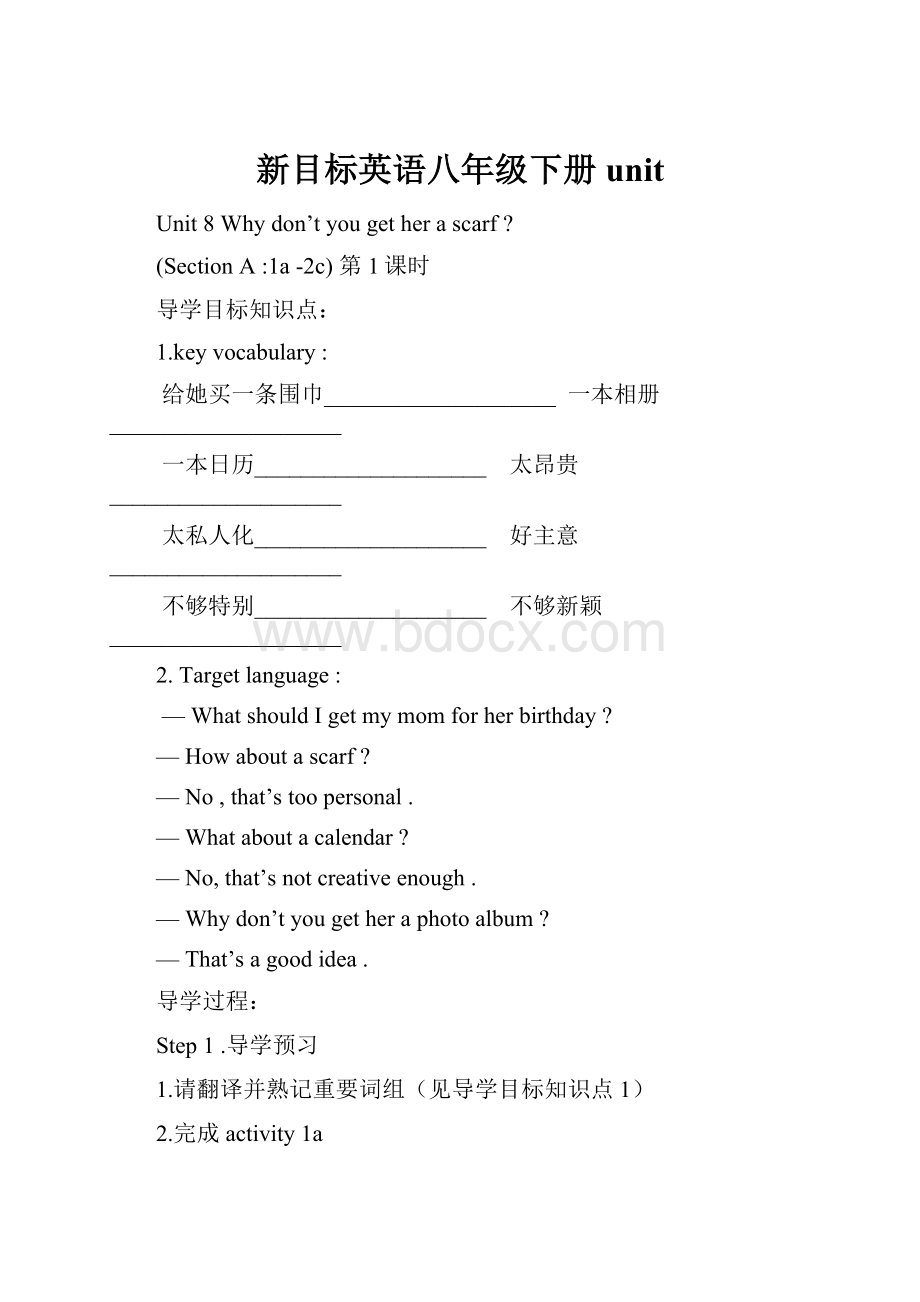新目标英语八年级下册unit.docx
《新目标英语八年级下册unit.docx》由会员分享,可在线阅读,更多相关《新目标英语八年级下册unit.docx(20页珍藏版)》请在冰豆网上搜索。

新目标英语八年级下册unit
Unit8Whydon’tyougetherascarf?
(SectionA:
1a-2c)第1课时
导学目标知识点:
1.keyvocabulary:
给她买一条围巾____________________一本相册____________________
一本日历____________________太昂贵____________________
太私人化____________________好主意____________________
不够特别____________________不够新颖____________________
2.Targetlanguage:
—WhatshouldIgetmymomforherbirthday?
—Howaboutascarf?
—No,that’stoopersonal.
—Whataboutacalendar?
—No,that’snotcreativeenough.
—Whydon’tyougetheraphotoalbum?
—That’sagoodidea.
导学过程:
Step1.导学预习
1.请翻译并熟记重要词组(见导学目标知识点1)
2.完成activity1a
Cheap
Expensive
Boring
Interesting
Step2.ListenActivity1b
1.建议
(1):
Whydon’tyou+dosth…?
或Whynot+dosth?
“为什么不……呢?
”
e.g.Whydon’tyoucomealittleearlier?
=Whynotcomealittleearlier?
为什么不早点来呢?
建议
(2):
What/Howabout…?
“…怎么样?
”
其后接名词、代词、动名词等具有名词性质的单词或短语。
e.g.Howaboutascarf?
(买)一条围巾如何?
Whataboutgoingfishing?
去钓鱼怎么样?
2.评价:
That’stooexpensive.那太昂贵了。
That’snotspecialenough.那不够特别。
That’sagoodidea.那是个好主意。
Thatsoundsgood.那听起来不错。
3.课堂练习:
完成对话
A:
What’sup?
B:
I__________help.What__________Igetmymomforherbirthday?
A:
____________________ascarf?
B:
No,that’s__________boring.
A:
Hmm,Howaboutadictionary?
B:
That’stooboring,__________.
A:
Well,____________________yougetheracamera?
B:
No,way!
__________tooexpensive.
A:
I’vegotit!
Whatabout__________tennisballs?
B:
Tennisballs?
No,they’retoocheap.
Step3.Listen.Activities2aand2b.
1.Listenandfinishthesetasksin2aand2b.
2.Readtheconversationsandactthemout.
Step4.Pairwork.Activity2c
1.Readthesampleconversation.
2.课外练习:
编类似对话。
教师引导,学生自我小结:
课外练习
A.用所给单词的适当形式填空。
1.Let’s__________iteight–thirty.(make)
2.—Shallwe__________tothepark?
—Allright.(go)
3.Howabout__________swimming?
(go)
4.Whynot__________acamera?
(get)
5.Whydon’tyou__________yourparents?
Theymayknow.(ask)
B.句型转换。
1.Howdoyoulikethatcamera?
(同义句)
__________doyou____________________thatcamera?
2.Whynotgoshoppingwithus?
(同义句)
____________________goingshoppingwithus?
3.Theproblemistoodifficultforhimtoworkout.(同义句)
Theproblem______________________________forhimtoworkout.
4.Youshouldgetsomeflowersforyourfriend.(提问)
________________________________________formyfriend?
课后反思:
Unit8Whydon’tyougetherascarf?
SectionA:
3a-4第2课时
导学目标知识点:
1.Keyvocabulary:
收到一件礼物____________________在他六岁生日那天____________________
一个幸运的家伙____________________离开学校,毕业____________________
在我十岁生日____________________做一顿不同寻常的饭菜________________
2.Keysentences:
What’sthebestgiftJoehaseverreceived?
Whataluckyguy?
Isitsomeoneinyourfamily?
导学过程:
Step1.导学预习
1.请翻译并熟记重要词组(见导学目标知识点1)
2.预习activity3b活动中的对话,并用自己真实的信息完成类似对话。
Step2.Pairwork:
Activity3b
1.Readthesampleconversation.
2.检查预习中学生编对话的情况,并请三个学生板书他们的对话在黑板上,其余同学互改,并对话练习。
3.Note:
What’sthebestgiftyouhaveeverreceived?
onmytenthbirthday.
Step3.Pairwork:
1.Readthesampleconversation.
2.口头问答关于Maria,Tom,Vera的信息,并填好表格。
然后请三个同学分别板书三组对话。
3.Note:
What’sthebestgiftJoehaseverreceived?
onhissixthbirthday.
Whataluckyguy!
Step4.Groupwork
教师示范,然后学生分组自主进行活动。
教师引导,学生自我小结:
英语中,感叹句是用来表示喜、怒、哀、乐等强烈感情的句子。
感叹句的两种常见结构:
1.what引导的感叹句
what作为引导词,在句中为形容词,充当定语,用来修饰它后面的名词或名词词组。
(1)What+a/an+adj.+单数名词+主语+谓语!
What______________________________itis!
多么令人兴奋的工作啊!
(2)What+adj.+名词复数+主语+谓语!
What____________________theyare!
多么美丽的一些花啊!
(3)What+adj.+不可数名词+主语+谓语!
What____________________itis!
多么坏的天气啊!
2.how引导的感叹句
how作为引导词,在句中为副词,用来修饰后面的形容词或副词。
(1)How+adj.+主语+谓语!
How__________theparkis!
多么宁静的公园啊!
(2)How+adv.+主语+谓语!
How__________heworks!
他工作多努力呀!
(3)How+主语+谓语!
Howtime__________!
光阴似箭!
课外练习
A.根据句意拼写单词。
1.Don’taskherp__________question.Orshewon’tanswerit.
2.Mymotherisgoingtomakeas__________mealformebecauseit’smybirthday.
3.Peter__________aletterfromhispenpalyesterday.
4.Todayisher__________birthday.(nine)
5.Nineismyl__________number.
6.Itwasrainingwhenhe__________school.(leave)
B.句型转换。
1.Howfriendlythegirlis!
(同义句)
________________________________________sheis!
2.Youwereverylucky.(改为感叹句)
____________________youwere!
3.What’syourfavoritepresent?
(同义句)
Whichpresent__________you____________________
Unit8Whydon’tyougetherascarf?
SectionB:
1a-2c第3课时
导学目标知识点:
1.Keyvocabulary:
mouse复数____________child复数____________
最受欢迎的____________最不寻常的____________
不够友好____________容易照顾____________
太可怕____________一个6岁的小孩____________
一个11岁的男孩____________一位80岁的老奶奶____________
2.Targetlanguage:
A:
Ithinkadogisagoodpetfora6-year–oldchild.
B:
Really?
Idon’tagree.Dogsaretoodifficulttotakecareof.
A:
Howaboutagoldfish?
Fishareeasytotakecareof.
B:
They’retooboring.
导学过程:
Step1.导前预习
1.你所知道的动物名称:
__________________________________________________
_____________________________________________________________________
2.请翻译并熟记重要词组:
(见导学目标知识点1)
Step2.学习,分享。
1.Activity1a.完成自己的图表,并与同学比较一下你的选择。
2.Activity1b.写下自己的句子,并与同学分享:
____________arethemostpopularpets.
____________arethemostunusualpets.
Step3.Listen.Activities2aand2b.
1.完成听力任务,掌握所听到的动物名称和对它们的评论信息。
2.课堂练习:
完成对话并熟读。
A:
So,what____________ofpetdoyouwanttoget?
B:
Howaboutagoldfish?
Fish____________easytotakecareof.
C:
They’re____________boring!
Howaboutasnake?
Snakesareinteresting.
B:
Eeew!
Snakesaretooscary!
____________getanicepetlikeacat.
A:
Acat?
Idon’tlikecats.Catsaren’tfriendly____________.
B:
Wellthen,howaboutadog?
Dogsmakegreatpets.
A:
That’s____________.Hey,howaboutthatdog?
Isn’thebeautiful?
C:
Yes,buthishairistoolong.Idon’twantto_____________doghaireveryday.
A:
Oh,allright.Well,thathamsteroverthere____________nice.
He____________friendly,andhehasshorthair.
B:
Yeah,he’sperfect!
C:
Let’sgethim!
Step4.Pairwork.Activity2c.
1.写下对话,与同伴共同完成。
2.Actoutyourconversations.
A:
Ithinkadogisagoodpetfora6–year–oldchild.
B:
___________________________________________________________________
A:
___________________________________________________________________
B:
___________________________________________________________________
A:
___________________________________________________________________
B:
___________________________________________________________________
A:
___________________________________________________________________
B:
___________________________________________________________________
教师引导,学生自我小结:
△sth.+be+adj.+todo通常可以用Itis+adj.+todosth.来表示。
上句可以改为Itistoodifficulttotakecareofdogs.练习:
Thatquestionisveryhardformetoanswer.
=__________________veryhardforme__________________thatquestion.
Theboxesaretooheavyforhimtocarry.
=__________________tooheavyforhim__________________theboxes.
课外练习
A.用所给词的适当形式填空。
1.____________somethingforyourmotheristhebestgift.(do)
2.It’sgoodforyou____________more.(read)
3.Parrotsarethemost____________pets.Theycanspeaktopeople.(usual)
4.Peterisan____________boy.(8yearsold)
5.Ineedagoodcompany____________with.(work)
B.同义句改写。
1.Peteriselevenyearsold.
Peteris____________________________________boy.
2.Thereare800wordsintheletter.
It’s____________________________________letter.
3.Shewasveryangry.Shecouldsaynothing.
Shewas____________angrytosay____________.
课后反思:
Unit8Whydon’tyougetherascarf?
SectionB:
3a-4第4课时
导学目标知识点:
1.Keyvocabulary:
大肚猪____________trendy最高级____________
完美的,理想的____________为她建一所专门的猪舍____________
需要许多关爱____________足够的时间____________
吵闹的,喧闹的____________一个好伙伴____________
2.Keysentences:
Whydoyouthinkpot–belliedpigsarepopular?
Davidhasapot–belliedpignamedConnie.
She’stoobigtosleepinthehouse.
导学过程:
Step1.导前预习
1.spend…on在…上花(时间或金钱)
如:
Hespendsalotofmoneyonbooks. 他花许多钱买书。
spend…(in)doing sth.花(时间或金钱等)做某事。
如:
Thegovernmentwillspendmoneylookingafterthepatients.
政府要花钱去照料那些病人
英语中表“花费”的词语:
(l)spend的主语必须是“人”,宾语可以是钱、精力、时间等。
如:
Hespendsmuchmoneyonbooks.他平时将很多钱用在买书上。
Hespentalotofmoney(in)buyinganewcar.他花很多钱买了一辆新车。
(2)cost的主语必须是“物”或“事”,表示“费用”、“耗费”,后接life,money,health,
time等,侧重于“花费”的代价。
如:
Thebookcosthimonedollar.这本书用了他一美元。
Itcostsyou12poundstogotoLondonbyship.乘船到伦敦要用12英镑。
(3)take表示“花费”时,其主语一般是“一件事”,有时主语也可以是人,它说明事情完成“花费了……”。
如:
Ittookmetenminutestogotothepostoffice.到邮局用用了我十分钟时间。
Ittakesalotofmoneytobuyahouseasbigasthat.买一座像那样的房子要花很多钱。
(4)pay的基本意思是“支付”,作为及物动词,宾语可以是“人”、“钱”,
如:
Hepaidthetaxiandhurriedtothestation.他付了出租车的钱,急忙向车站赶去。
Theyhadtopaytwohundredfrancs.他得付一百法郎。
We'llpayyouinafewdays.几天后我会给你钱。
(5)payfor的宾语为“物”、“事”,for表示支付的原因。
如:
You'llhavetopaymetendollarsaweekforyourmeals.你得每周付给我十美元饭钱。
注意:
下面两句中payfor的意义不同。
Ofcoursewehavetopayforwhatwebuy.当然我们买东西得付钱。
Don'tworryaboutmoney;I'llpayforyou.别担心钱,我会替你付的。
2.交流有关仓鼠的信息,并用所给信息完成关于仓鼠的文章。
(Activity3b)
Step2.Read.Activity3a.
1.Readthearticleandanswerthesequestionsin3a.
2.朗读,根据文章内容补全句子:
(1)Davidhasapot–belliedpig____________Connie.